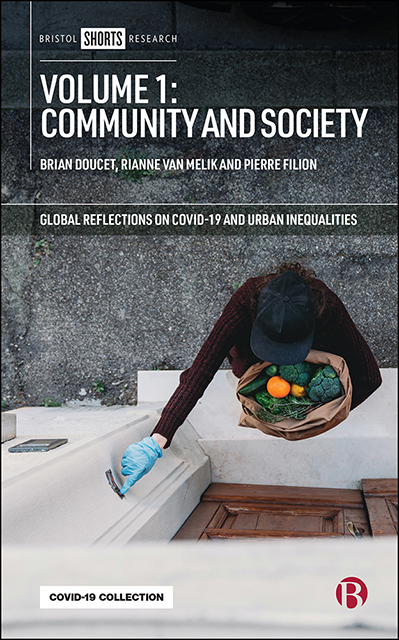Book contents
- Frontmatter
- Contents
- List of Figures and Tables
- Notes on Contributors
- Acknowledgments
- Preface to All Four Volumes of Global Reflections on COVID-19 and Urban Inequalities
- One Introduction
- Part I Working Practices
- Part II Life During Lockdown
- Part III Migration, Migrants, and Refugees
- Part IV Age, Race, Gender, and Ability
- Index
Eighteen - What is the Relationship between COVID-19 and the Movement to ‘Defund the Police’?
Published online by Cambridge University Press: 13 April 2023
- Frontmatter
- Contents
- List of Figures and Tables
- Notes on Contributors
- Acknowledgments
- Preface to All Four Volumes of Global Reflections on COVID-19 and Urban Inequalities
- One Introduction
- Part I Working Practices
- Part II Life During Lockdown
- Part III Migration, Migrants, and Refugees
- Part IV Age, Race, Gender, and Ability
- Index
Summary
COVID-19 triggered an extraordinary disruption to social, economic, and political life that is unprecedented in recent decades. As we have argued (in Dilworth and Weaver 2020), periods of major disruption give rise to unusually fluid circumstances in which settled political arrangements become vulnerable to assault by political entrepreneurs who promote radical ideas, hitherto marginal to the political debate. In such circumstances, those ideas can gain rapid traction and have the potential to drive political development. We suggest that the COVID-19 pandemic was one such disruption.
We argue in this chapter that pandemic-generated crises of political authority established the conditions for the ‘defund the police’ idea to shift from the fringes of political debate into the mainstream in the wake of George Floyd's murder at the hands of the police in May 2020. This is not to diminish the more fundamental causes for protest such as structural racism or police tyranny, but it seems possible that contingent factors, such as COVID-19, allowed Floyd's murder to become a unique catalyst that facilitated diffusion of the ‘defund’ idea across cities in the United States, and indeed across the world. Put simply, we suggest that amid the disarray into which the pandemic threw urban society, new social forces seized the opportunity to make demands that would have fallen on deaf ears in the absence of the disruptive effects of COVID-19. As such, it stands as a case study of the relationship between the pandemic and social movement politics.
Exploring the relationship between fundamental causes and contingent factors in the case of COVID-19 and the George Floyd killing allows us to better understand the dynamics of policy change. We start with a brief examination of the disruptions associated with COVID-19. We then explore the ‘defund’ idea and how it developed and diffused to specific cities. We finally consider how COVID-19 may have facilitated the diffusion of the idea, arguing that the relationship between the pandemic and the idea is more contingent and random than others have suggested, yet it also has the potential to significantly and permanently impact the trajectory of urban political development in the United States and beyond.
The great disruption
In February and March 2020 countries across the globe instituted a range of unprecedented limits on international travel, domestic movement of people, and mandated shutdowns of business and educational services to limit the spread of COVID-19.
- Type
- Chapter
- Information
- Volume 1: Community and Society , pp. 197 - 208Publisher: Bristol University PressPrint publication year: 2021



